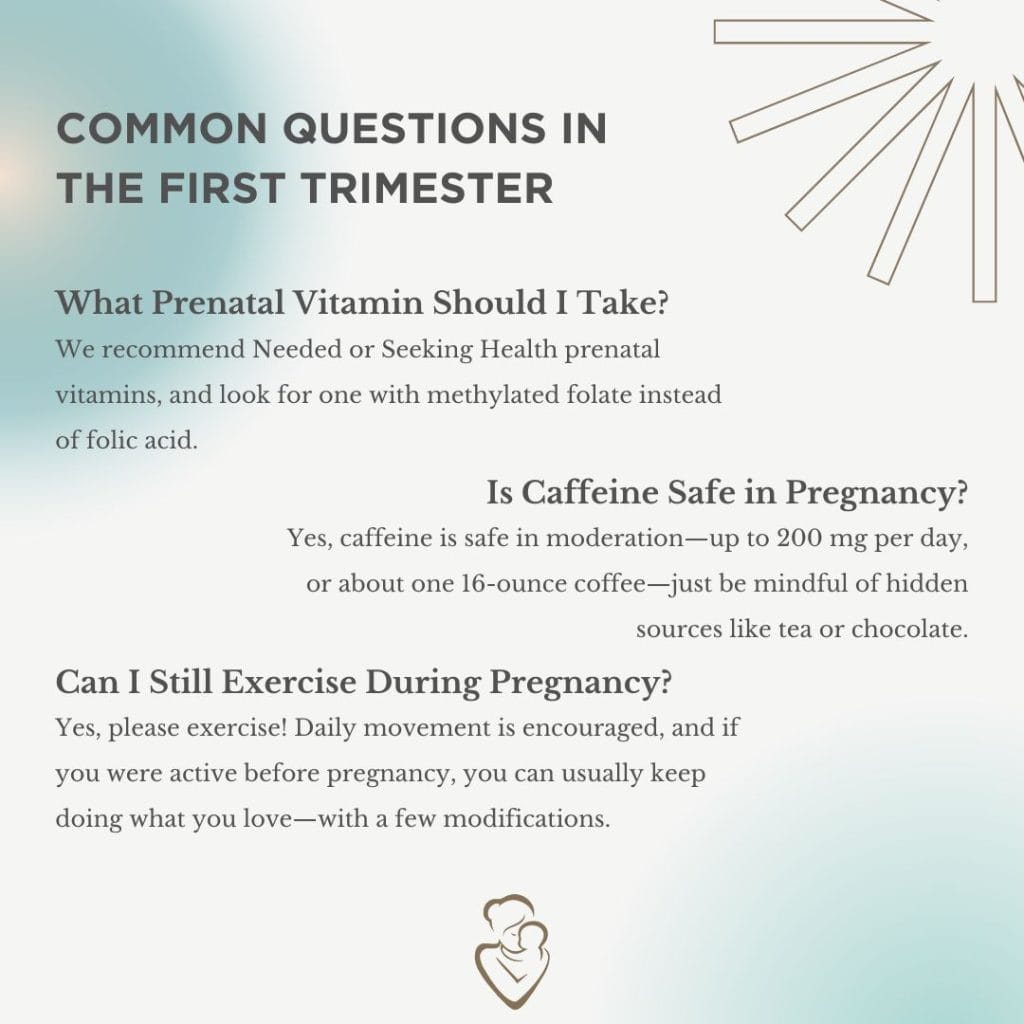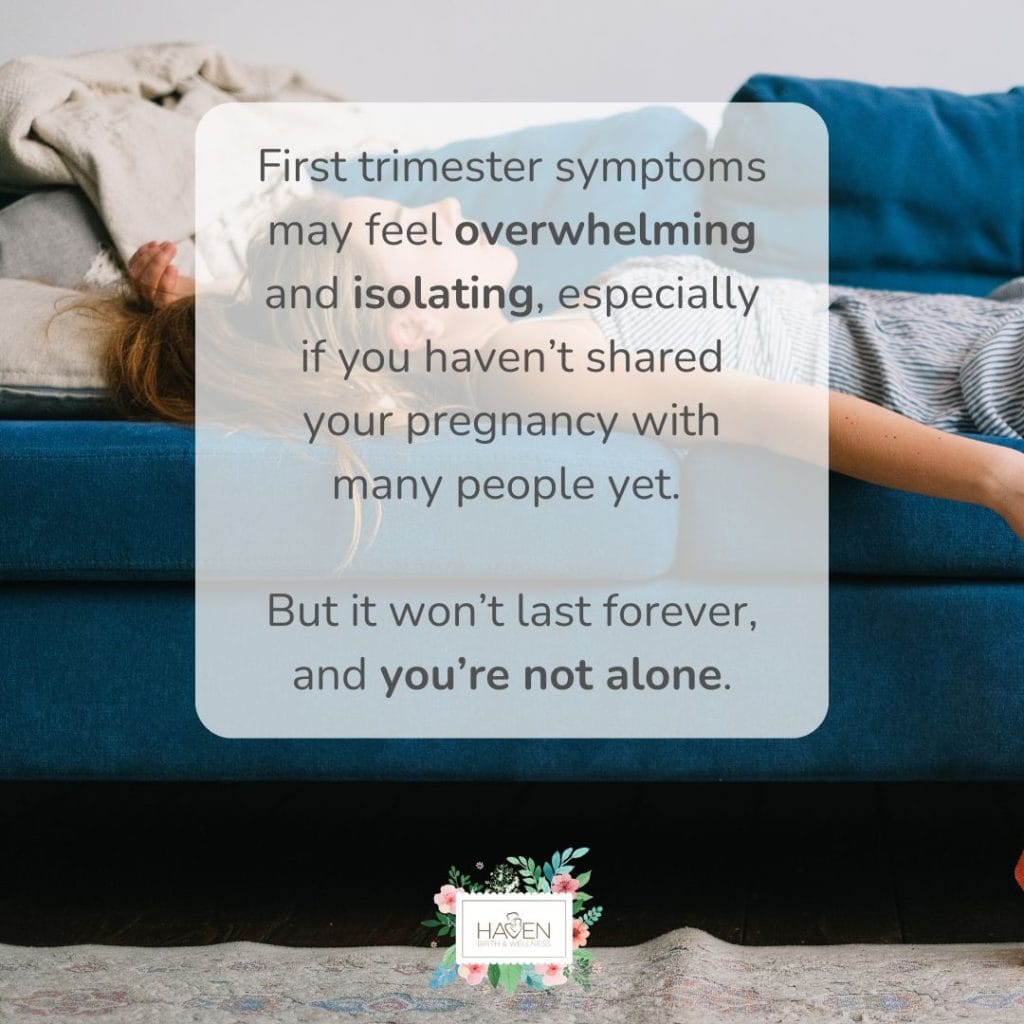

As a midwife, I get a lot of questions about pregnancy, especially during those early weeks. And it makes sense! Whether this is your first baby or you’re a seasoned parent, every pregnancy is unique.
Some of the most common questions we hear revolve around the first trimester:
- How long is the first trimester?
- What are the first trimester symptoms?
- What are signs your pregnancy is going well in the first trimester?
Let’s walk through what’s happening at this stage, what’s normal, and what to expect in those first crucial weeks.
How Long Is the First Trimester?
We traditionally divide pregnancy into three trimesters. Why? No one’s entirely sure, but one reason may be that pregnancy symptoms and developmental milestones tend to group together naturally across these phases. Or maybe it’s even simpler: 9 months divides up nicely into three sections.
So, how long is the first trimester? It’s the first 12 weeks of your pregnancy, and it’s packed with rapid changes and development for both you and your baby.
How Soon Can You Take a Pregnancy Test?
A good rule of thumb is to wait until you’ve missed your period to take a home pregnancy test. That said, many current over-the-counter tests can detect hCG (the pregnancy hormone) even a few days before your missed period. Some people test positive as early as three weeks pregnant.
If you get a negative result but still think you might be pregnant, wait a few days and test again.
How Accurate Are Pregnancy Tests?
Over-the-counter, urine-based pregnancy tests — yes, also called “pee sticks” — are generally considered around 99% accurate when used properly. Some brands market their products as having greater accuracy or earlier sensitivity than others, but the bottom line is they all use essentially the same method and will eventually tell you whether you’ve conceived.
False positives are rare, though something called a “chemical pregnancy” can happen. In these cases, hCG begins to rise as implantation occurs, but the pregnancy doesn’t progress. This can cause an early positive result that fades a few days later.
When it comes to accuracy, blood tests are the gold standard. If you continue to get a negative result from urine tests but haven’t gotten your period yet, you can contact your provider for a blood test to find out for sure.
Blood Testing and Signs Your Pregnancy Is Going Well in the First Trimester
Blood tests have the advantage of measuring more than just the presence of hCG, though they show that too.
While a qualitative hCG blood test indicates whether that hormone is present in your blood, quantitative hCG testing tells us how much of the hormone there is and whether it’s rising appropriately. In early pregnancy, we’re looking for that number to double about every 48 hours, which tells us things are progressing normally.
We often check progesterone levels through blood testing in early pregnancy as well. Progesterone doesn’t confirm pregnancy, but it does help sustain a pregnancy until the placenta takes over around 10–11 weeks, which is most of the first trimester. This can be especially helpful to monitor for someone who has experienced pregnancy losses in the past.
Common Questions in the First Trimester
What Prenatal Vitamin Should I Take?
There are a lot of good prenatal vitamins out there — and some not-so-great ones. Two brands we trust and often recommend are:
One important component to look for is methylated folate instead of folic acid. Many people have MTHFR gene variations (often without knowing it) that prevent their bodies from properly processing folic acid.
Is Caffeine Safe in Pregnancy?
Yes, in moderation. In fact, caffeine may help with some pregnancy-related migraines.
Research tells us that up to 200 mg of caffeine per day is generally safe in pregnancy. That’s about one 16-ounce coffee, or two 8-ounce cups. Just be mindful of other sources of caffeine, like tea, chocolate, and sodas, so you don’t accidentally exceed that daily total.

Can I Still Exercise During Pregnancy?
Yes, please exercise! We encourage all our clients to practice daily movement of some kind. If you were active before pregnancy, you can typically keep doing the same kinds of exercise you enjoyed before.
A few tips for pregnancy exercise:
- Walking is always great.
- If you want to continue weight lifting, simply start protecting your core and make modifications as your belly grows.
- I don’t recommend hot yoga due to its tendency to raise your core temperature.
- In general, if you can talk while exercising, you’re not overdoing it.
How You Might Feel: First Trimester Symptoms
Many moms start feeling first trimester symptoms around six weeks, but it varies. You might experience:
- Nausea or vomiting: Also known as morning sickness, though it can occur at any time; very common as hCG levels rise
- Extreme fatigue: But don’t worry, feeling drowsy and falling asleep easily is normal
- Breast tenderness or changes: Usually more noticeable during the second trimester, but can begin earlier
- Mild shortness of breath: Lung capacity changes as pregnancy progresses
- Acne or other skin changes: Consult your provider if you notice rashes or intense symptoms
- Headaches: Very common, often from shifting hormones
Regarding headaches, we typically recommend trying gentle, natural options first:
- Magnesium (400–800mg)
- Vitamin B2 (riboflavin)
- Electrolytes and good hydration
- Ginger (tea or capsules)
- Benadryl (25mg is safe)
If these aren’t enough, you can take Tylenol during your first trimester, but avoid ibuprofen.
What About Spotting?
Spotting can be scary, but it’s not necessarily a sign something’s wrong. Some moms spot early on from implantation bleeding, usually around 10–14 days after conception. This can happen right around when you’d expect your period and often only lasts a day.
Other common causes include:
- Subchorionic hemorrhage: A pocket of blood that forms between the placenta and uterus, which we can check for on an ultrasound. While it can be concerning, it often resolves on its own.
- Irritation of the cervix: The cervix is more sensitive during pregnancy, and irritation from exercise, sex, or even a bowel movement can cause some bleeding. This is a frequent source of light spotting without cramping and isn’t typically a cause for worry.
If you notice increasing or heavy spotting, especially if accompanied by cramps, passing clots, or passing tissues, contact your provider right away.
What Symptoms Aren’t Normal Parts of the First Trimester?
While first trimester experiences are diverse, certain symptoms definitely aren’t just another part of pregnancy. Talk with your provider if you experience:
- Fever: Bacterial or viral infections may cause a fever, but pregnancy itself doesn’t.
- Ongoing vomiting or diarrhea: Certain conditions like hyperemesis gravidarum require nutrition and hydration support, and often medication, to ensure you and your baby have the strength and nourishment you need.
- Fainting, dizziness, or blurred vision: These could indicate blood pressure or blood sugar issues that require attention and management.
- Swelling in your hands, face, or fingers: Early pregnancy swelling isn’t typical and needs to be evaluated.
- Spotting or bleeding issues mentioned above: We’re especially concerned with heavy bleeding or when bleeding occurs alongside cramping.

So, How Long Is the First Trimester?
Let’s circle back to how long is the first trimester? It’s 12 weeks, but it can feel a lot longer while you’re in it. Remember, your body is doing beautiful, hard work, and doing it well. This isn’t who you are now; it’s just one stage of the journey.
Give yourself grace. Rest when you can. Eat what you’re able, even if it’s not the picture-perfect diet right now. Ask for help from loved ones. Let yourself be supported.
First trimester symptoms may feel overwhelming and isolating, especially if you haven’t shared your pregnancy with many people yet. But it won’t last forever, and you’re not alone.
Your Haven team is here to walk with you every step of the way.

Lauren Schrenk is a midwife at Haven Birth & Wellness, dedicated to providing holistic, community-based care. With a deep passion for women’s health and natural birth, Lauren focuses on empowering women through informed choices and personalized care. She is excited to be part of Haven's mission to support families during such pivotal moments in their lives.
Originally from Georgia, Lauren now lives in Nashville with her husband, golden doodle, and their sweet daughter. Outside of midwifery, Lauren enjoys hiking, camping, traveling, and exploring Nashville’s vibrant community.
